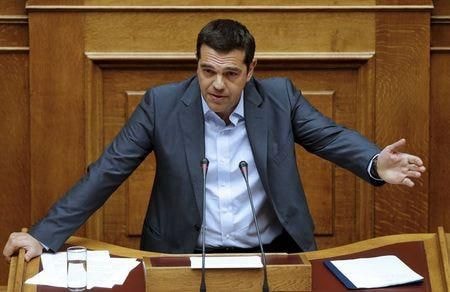Greece's expensive bailout package
(Baonghean) - The Greek Parliament on August 14 approved the country's third five-year bailout package, despite strong opposition in Athens. The tense vote led to divisions even within the ruling Syriza party in the mythical land.
Greek Prime Minister Alexis Tsipras won a hard-fought and costly victory early on Monday after opposition lawmakers approved an 85 billion euro ($94.8 billion) bailout package in a bid to keep the country from collapsing financially. The terms of the bailout were detailed in a 400-page document, underscoring the scope and complexity of the debate within Greece. After hours of tense debate, 222 lawmakers voted to accept the draft bailout terms, essentially winning by a landslide, with 64 votes against and 11 abstentions. However, only 118 of the 162 members of Mr. Tsipras's ruling coalition, which includes the radical left-wing Syriza party and the right-wing Independent Greeks, voted in favor of the bailout. This clearly shows that there is a certain division within the ruling party and those who should support Mr. Tsipras, at least up to this point, a third of Syriza MPs have not expressed their agreement with their leader, and the conditions set by international creditors are unacceptable to them. Immediately after the vote, Reuters news agency quoted a senior official in Tsipras' coalition as saying that the prime minister will hold a confidence vote after August 20, the deadline for repaying a large loan to the European Central Bank (ECB). The same news agency also quoted another senior official in the opposition New Democracy party, affirming that they will not support Mr. Tsipras.
 |
| Greek Prime Minister Alexis Tsipras speaks at the end of a parliamentary session in Athens on August 14. Photo: Reuters |
During an all-night debate before the vote, Tsipras urged lawmakers to make the “necessary choice” for Greece, warning strongly against a German-backed bridge loan that would plunge Greece back into “endless crisis.” Days earlier, the Greek prime minister had struck a deal with creditors aimed at keeping the country solvent. But the deal came at a heavy cost to ordinary Greeks, adding to the painful austerity measures that the left-wing leader had vowed to oppose during his election campaign earlier this year.
Now, lawmakers from the anti-austerity Syriza party have threatened to call snap elections as early as early September. In a statement signed by Panagiotis Lafazanis, a former cabinet minister, and 11 other Syriza members and posted on the far-right Iskra website, they declared: “The fight against the new bailout begins today, by mobilizing people in every corner of Greece.” Lafazanis added, pointing directly at Prime Minister Tsipras: “I am ashamed of you. We no longer have democracy… but instead a eurozone dictatorship.”
Opposition figures such as Lafanzanis have urged the Greek government to stick to its election promises and pledges to try to reverse the wave of spending cuts and tax hikes that have had a significant negative impact, causing widespread unemployment and further straining the already ailing Greek economy over the past six years. The troika of international creditors are “seriously concerned” about Greece’s ability to maintain its debt levels, according to an analysis seen by Reuters, but this could be achieved without debt forgiveness by extending the grace period before Athens must start repaying the interest and principal on its bailout loans.
As one of the creditor institutions, the International Monetary Fund (IMF) “favors” the form of “discounting” debt while Germany is firmly against it, although some leading figures have proposed no limit on debt extensions. Months of difficult negotiations between Athens and its creditors have affected the economy that just emerged from a prolonged crisis last year before returning to a downward trend once again. According to data released on August 13, the Greek economy began to show signs of growth again in the second quarter of this year, completely surprising economists who predicted a deeper recession. However, despite the somewhat optimistic news and hope for Greece’s recovery, analysts continue to believe that the Greek economy has continued to deteriorate since the end of the second quarter in the context of the government imposing capital controls on June 29 in an effort to save the Greek banking system from collapse.
The third bailout bill for the Greek land of fairy tales has finally been passed, but it seems that the Greek Prime Minister has paid a heavy political price. Nearly a third of his party members have rejected the bailout, a figure that is even higher than expected. They are wondering if their Prime Minister has betrayed his campaign promises, has he forgotten his will to oppose “austerity”? In theory, Alexis Tsipras seems to have lost his majority in parliament and his government is on the brink of “hanging by a thread”. Many sources say that he will hold a confidence vote next week, bringing the possibility of snap elections in the fall a little closer.
Phu Binh






